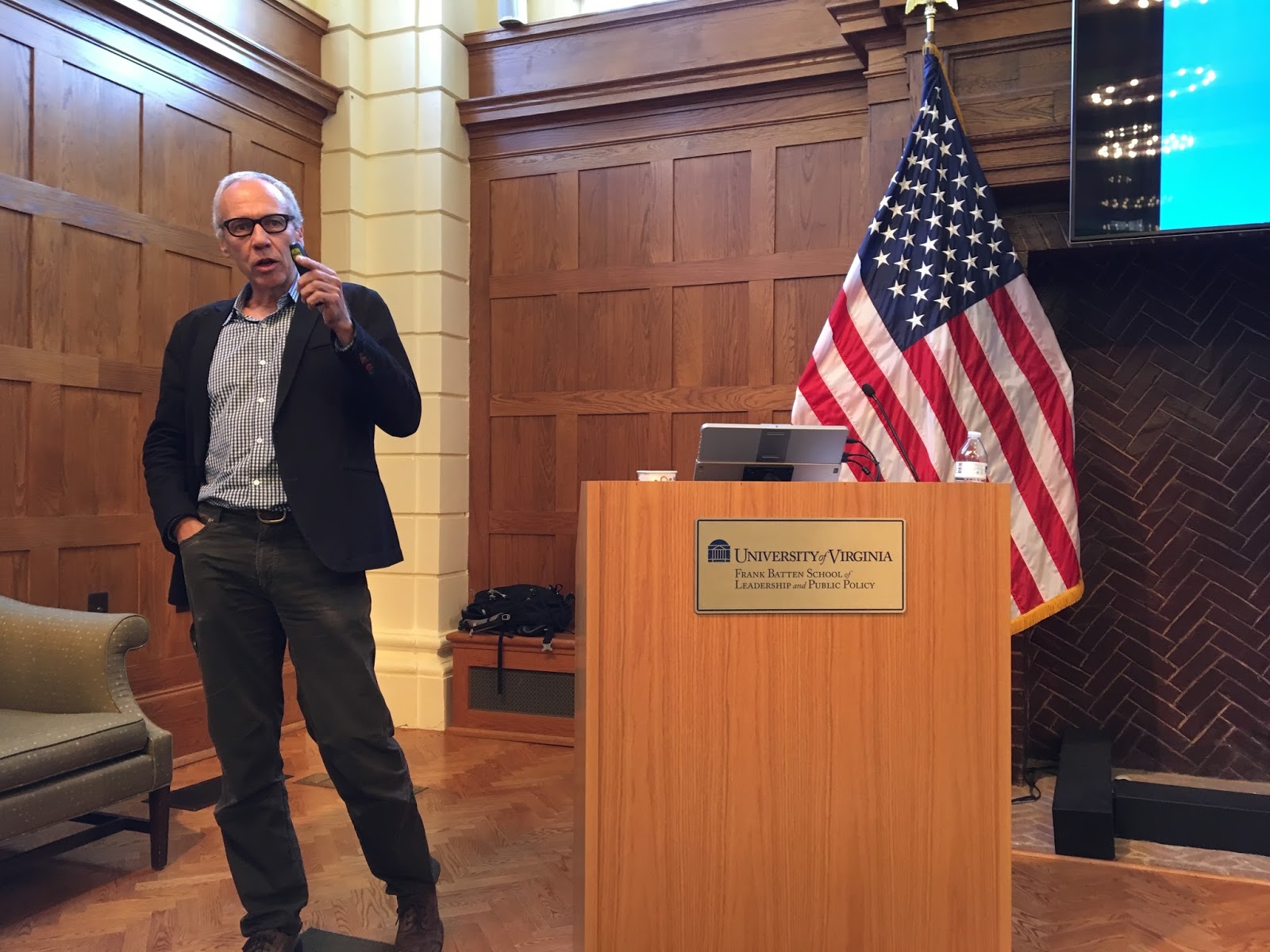
Hiking in Shenandoah on Sunday before his hike (Andres, Ted, and Jay)

Ted’s talk in the great room at Batton School of Public Policy.
Abstract: Climate engineering (CE)—intentional, global-scale modification of the environment to help offset the effects of elevated greenhouse gases—appears able to reduce climate-change risks beyond what is possible with mitigation and adaptation alone, including enabling integrated climate-response strategies that reduce risks in ways not otherwise achievable. Moreover, large-scale use of CE is probably necessary to achieve prudent climate-change limits, including the Paris targets of limiting global heating to 1.5 to 2.0°C. CE cannot replace mitigation or adaptation, which remain essential to limiting climate risks. And CE in its various forms, both large-scale atmospheric carbon removal and sunlight-scattering solar geoengineering, poses novel, substantial, and uncertain risks.
The treatment of CE thus far in climate research, assessment, scenarios, and policy debates has been gravely inadequate. In view of the prospects CE poses for great benefit or harm, it urgently requires expanded systematic research, and serious critical examination in climate-change assessments and scenarios – despite the challenges such examination will pose to many comforting, widely shared presumptions of climate policy debates. The prospect of CE also poses acute challenges to international decision-making and institutions, whether the aim is to use it competently, prudently, and legitimately in the context of an effective strategic climate response, or to make an effective and enforceable decision to renounce it. Having an informed capability to deal with domestic and international policy challenges related to CE when they arise – which they will – requires urgent attention to its capabilities, risks, and governance needs.
Bio (from my faculty web page): Feel free to shorten or edit as per your needs.
Edward A. (Ted) Parson is Dan and Rae Emmett Professor of Environmental Law and Faculty Co-Director of the Emmett Institute on Climate Change and the Environment at the University of California, Los Angeles. Parson studies international environmental law and policy, the role of science and technology in policy-making, and the political economy of regulation. His articles have appeared in Science, Nature, Climatic Change, Issues in Science and Technology, the Journal of Economic Literature, and the Annual Review of Energy and the Environment. His most recent books are A Subtle Balance: Evidence, Expertise, and Democracy in Public Policy and Governance, 1970-2010 (McGill-Queens University Press, 2015), The Science and Politics of Global Climate Change (with Andrew Dessler) (2nd ed. Cambridge, 2010), and Protecting the Ozone Layer: Science and Strategy (Oxford, 2003), which won the 2004 Sprout Award of the International Studies Association and is widely recognized as the authoritative account of the development of international cooperation to protect the ozone layer.
Parson has led and served on multiple advisory committees, for the National Academy of Sciences, the U.S. Global Change Research Program, and other national and international bodies. He was formerly Joseph L. Sax Collegiate Professor of Law, Professor of Natural Resources and Environment, and Professor of Public Policy at the University of Michigan, and spent twelve years on the faculty of Harvard’s Kennedy School of Government. In addition to his academic positions, Parson has worked and consulted for the White House Office of Science and Technology Policy, the Office of Technology Assessment of the U.S. Congress, the Privy Council Office of the Government of Canada, the U.N. Environment Program, and the International Institute for Applied Systems Analysis (IIASA). He holds degrees in physics from the University of Toronto and in management science from the University of British Columbia, and a Ph.D. in Public Policy from Harvard. In former lives, he was a professional classical musician and an organizer of grass-roots environmental groups.